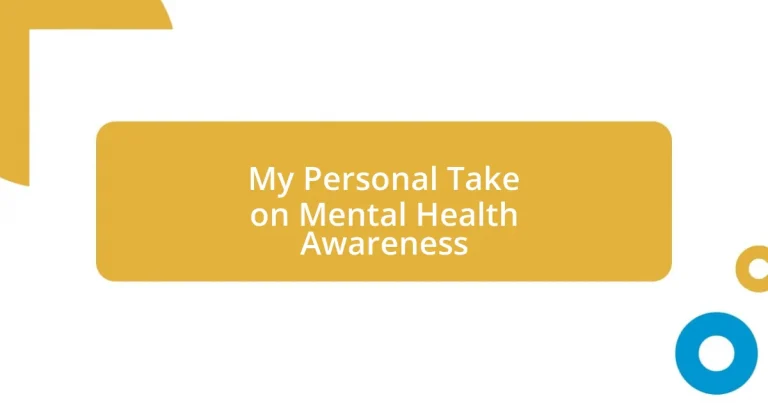Key takeaways:
- Mental health affects both individual well-being and societal connections, emphasizing the need for open discussions to foster a supportive environment.
- Recognizing signs of mental health issues and knowing when to seek support are crucial for personal well-being.
- Self-care strategies, such as mindfulness and building a support network, are essential for managing mental health effectively.
- Creating a supportive environment involves active listening, setting clear boundaries, and expressing appreciation, which enhances interpersonal relationships.
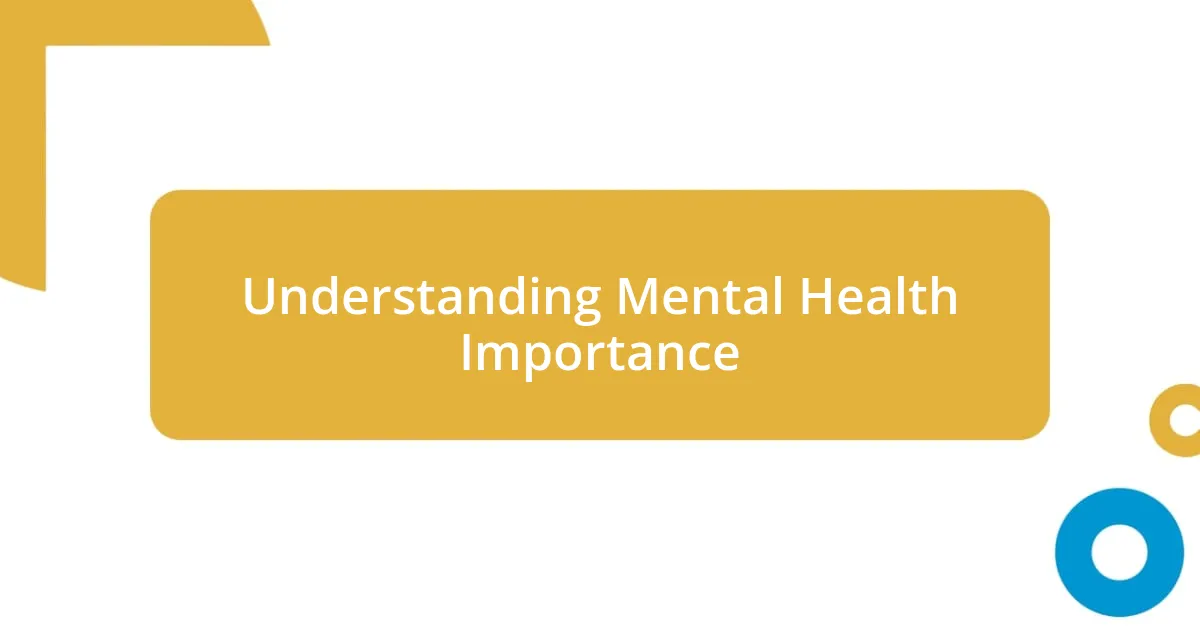
Understanding Mental Health Importance
Understanding the importance of mental health is crucial because it affects every aspect of our lives. I remember a time when I pushed myself to the limits at work, ignoring my growing anxiety. That experience left me questioning how effectively I was functioning daily—was I really healthy if I was sacrificing my well-being for productivity?
Mental health isn’t just an individual concern; it’s a societal need. I’ve seen friends struggle silently, believing that their feelings were something to be ashamed of. This made me realize that when we don’t talk about mental health openly, we leave so many people feeling isolated. How can we expect to create supportive environments if we can’t discuss our struggles?
Moreover, understanding mental health can transform how we interact with others. I once had a colleague who seemed distant, but once I reached out, we discovered shared pressures that fostered a bond. This taught me that empathy and knowledge about mental health can lead to stronger connections and a healthier workplace, ultimately benefiting everyone involved. How often do we overlook the power of simply checking in with someone?
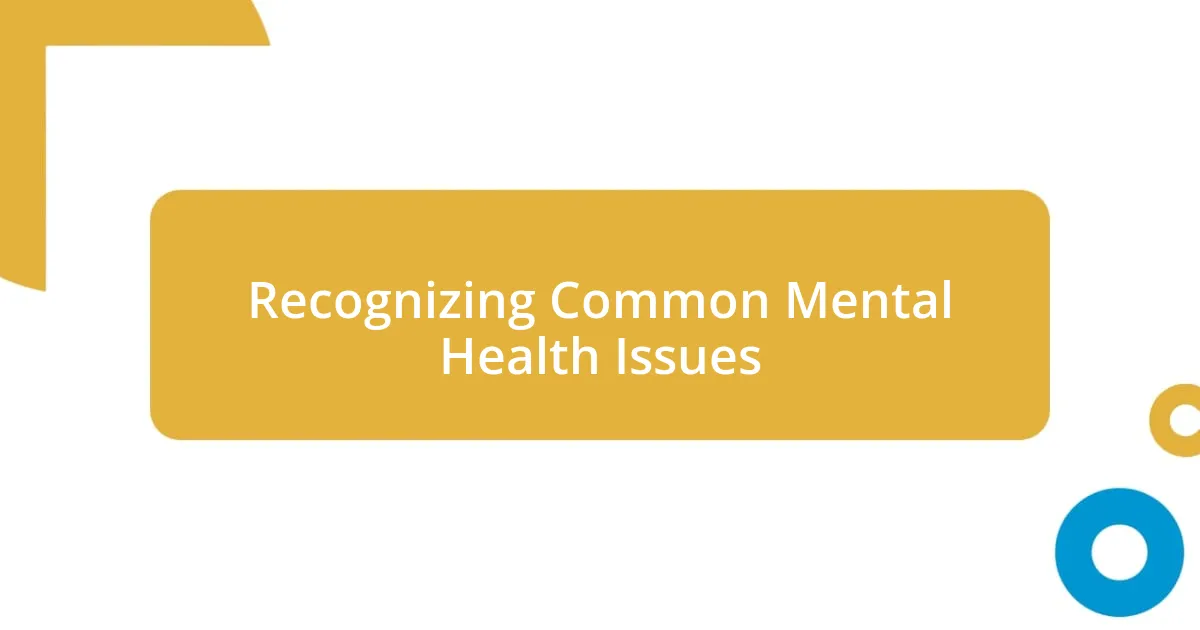
Recognizing Common Mental Health Issues
Recognizing common mental health issues starts with understanding their signs. For instance, I’ve encountered friends who displayed sudden changes in mood, sleep patterns, or energy levels without clear reasons. Those shifts often pointed to deeper struggles, reminding me that even subtle changes in behavior can signal the need for support.
It’s also fascinating how these issues can manifest differently in everyone. When I was dealing with depression, it crept in slowly, affecting my motivation and interest in activities I once loved. Sometimes, I found myself withdrawing from social events, not even realizing until a close friend pointed it out. This personal experience highlights the importance of being aware not just of our feelings but also of how they affect our relationships and daily lives.
The table below summarizes some common mental health issues and their key characteristics. I find it incredibly helpful to have such insights at hand, as it encourages more informed conversations and can foster understanding among peers.
| Mental Health Issue | Key Characteristics |
|---|---|
| Anxiety Disorders | Constant worry, restlessness, physical symptoms like rapid heartbeat. |
| Depression | Persistent sadness, lack of interest, changes in sleep and appetite. |
| Bipolar Disorder | Extreme mood swings from high energy to deep lows. |
| Post-Traumatic Stress Disorder (PTSD) | Flashbacks, nightmares, severe anxiety after trauma. |
| Obsessive-Compulsive Disorder (OCD) | Recurrent unwanted thoughts, compulsive behaviors to alleviate anxiety. |
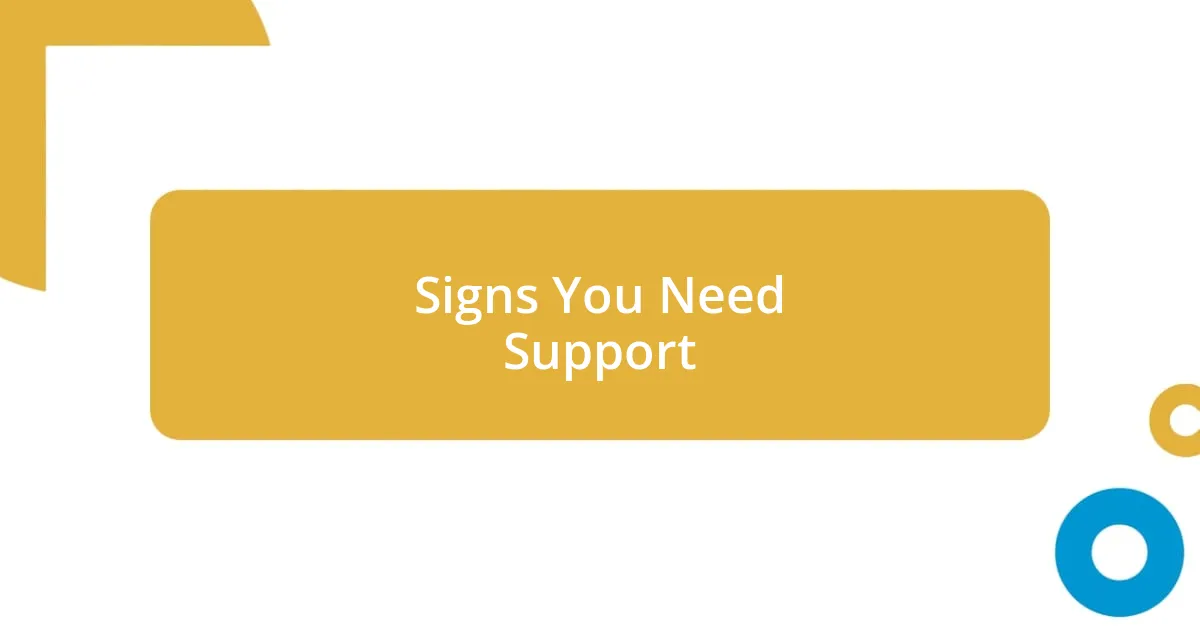
Signs You Need Support
Recognizing when you need support isn’t always straightforward. I know from my own journey that a persistent feeling of being overwhelmed can creep in unnoticed. I once felt like I was living in a fog, unable to shake off sadness or fatigue, as if I were simply going through the motions of life. These moments can be deceptive, causing us to believe we can manage alone when, in reality, reaching out is often the hardest but most necessary step.
So, how can you tell when it might be time to seek support? Here are some common signs to look out for:
- Continuous feelings of sadness or hopelessness.
- Changes in appetite or significant weight loss/gain.
- Difficulty concentrating or making decisions.
- Withdrawal from friends, family, and social activities.
- Increased irritability or mood swings.
- Declining performance at work or school.
- Physical symptoms like headaches or stomach issues without a clear cause.
Recognizing these signs in ourselves can be tough; I remember feeling embarrassed that I couldn’t “just get over it.” But acknowledging that we need support is a profound strength. It’s a step toward self-care that many overlook. Each sign is a flag indicating that it’s okay to reach out—whether to friends, family, or professionals. You are not alone in this!
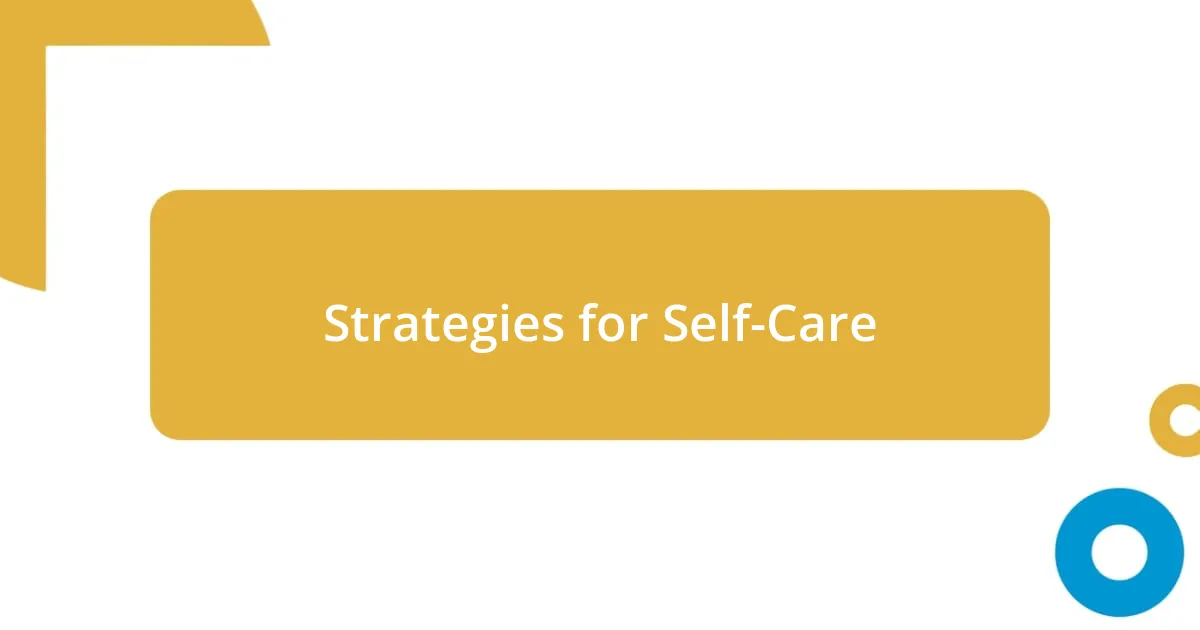
Strategies for Self-Care
Taking care of ourselves is crucial, especially when life feels overwhelming. One strategy that I found incredibly effective is setting aside time for activities that refresh my spirit. For instance, I used to dedicate Sunday afternoons to hiking in nature. It’s amazing how stepping away from screens and breathing in fresh air can change your perspective. Have you ever stepped outside and felt that immediate release?
Another approach to self-care is practicing mindfulness. When I first tried meditation, I was skeptical. But dedicating just a few minutes each day to focus on my breathing opened up a new space of calmness in my mind. It’s not about clearing your thoughts entirely but about acknowledging them without judgment. I often remind myself that any moment spent connecting with my thoughts is an investment in my mental well-being.
Finally, I can’t emphasize enough the importance of creating a support network. Having friends or family around who understand what you’re going through can make a huge difference. I’ve experienced nights where sharing my struggles with a close friend lightened my emotional load. It reminded me that vulnerability is not a weakness but a bridge to deeper connections. What strategies have you explored in your self-care journey? It’s all about finding what resonates with you personally.
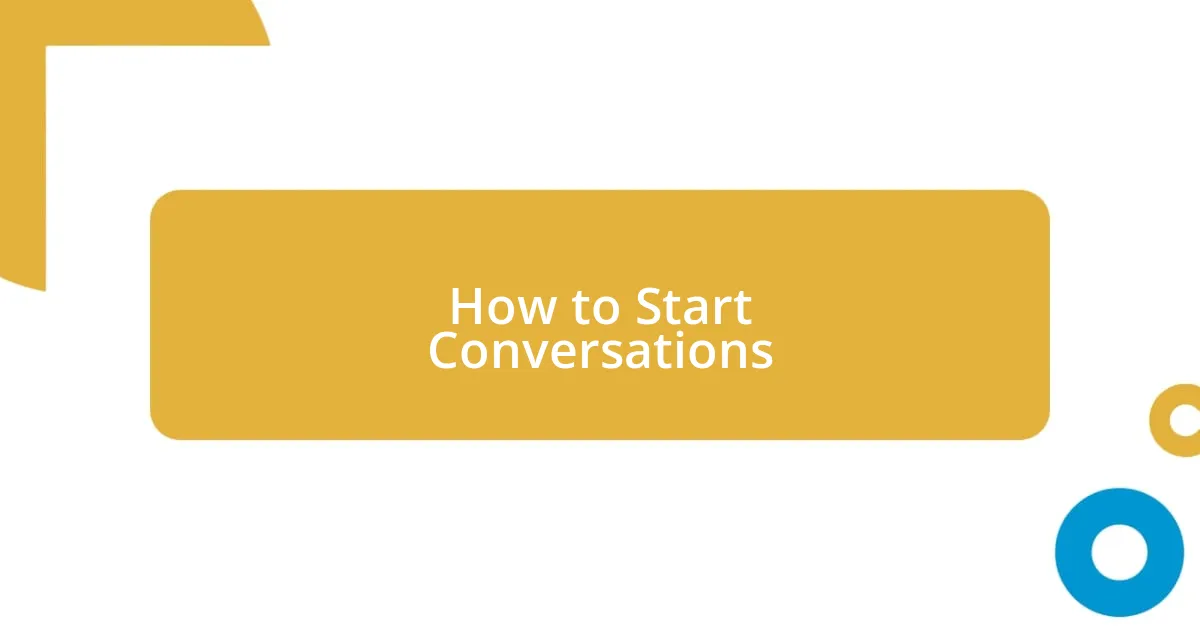
How to Start Conversations
Starting conversations about mental health can feel daunting, but I’ve found that asking open-ended questions can make a world of difference. For instance, instead of simply asking, “Are you okay?” I’ve started framing questions like, “How have you been feeling lately?” This simple tweak allows the other person to share their thoughts more freely, bypassing the often automatic “I’m fine” response.
I also think it’s essential to create a comfortable environment. I remember a time when I sat down with a colleague at a coffee shop that we both loved—the familiar atmosphere seemed to loosen the tension. We chatted about everything from our weekend plans to the stressful projects at work before I gently nudged the topic towards how we were managing our mental health. Choosing a relaxed setting makes those conversations feel less like interviews and more like supportive discussions.
Don’t underestimate the power of sharing your own feelings, too. Early in my journey, I often worried about burdening others with my struggles. But once I shared my experiences, I noticed a shift. I wasn’t just opening a door; I was inviting others in to share their thoughts and feelings, which led to some profound connections. Have you ever thought about how your vulnerability might inspire someone else to speak up? It’s incredible what can happen when you take that leap together.
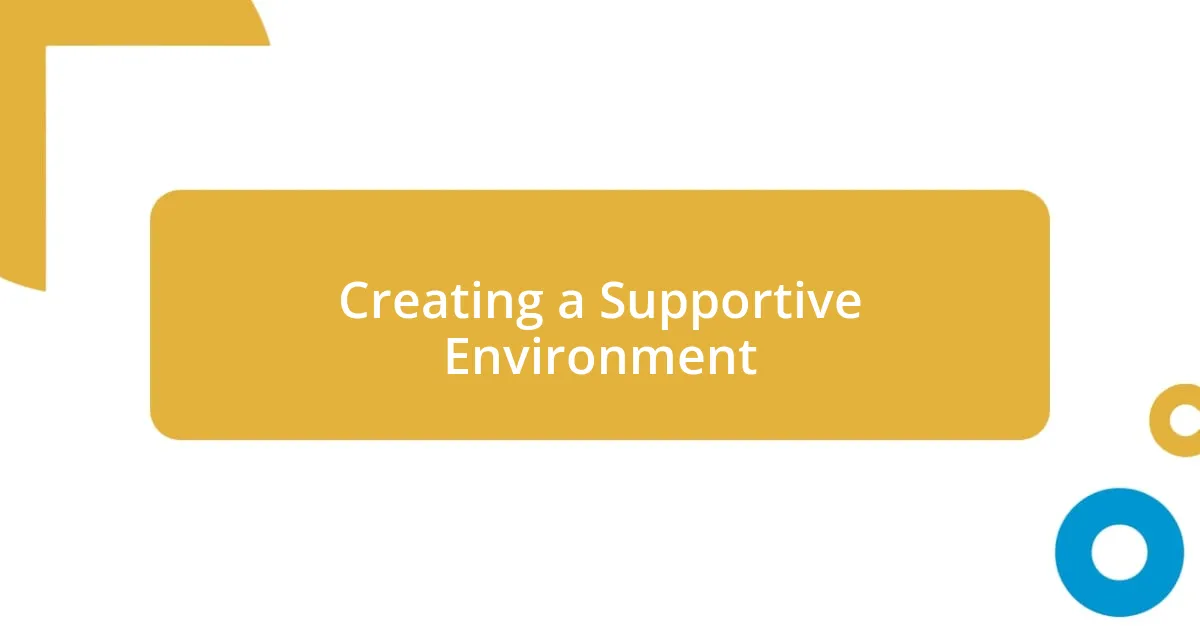
Creating a Supportive Environment
Creating a supportive environment starts with active listening. I remember sitting with a friend who was really struggling, and instead of offering quick fixes, I just listened. Being present in that moment made them feel valued and understood, something so simple yet powerful. Have you ever felt the relief when someone truly hears you? That connection fosters an atmosphere where people feel safe to share.
Another key element is setting clear boundaries that protect emotional well-being. I’ve learned that it’s okay to say no sometimes. For instance, I used to overload myself with social commitments until I realized how drained I felt afterward. When I began to prioritize my needs and communicate them to others, I noticed a shift in how supported I felt within my circle. Isn’t it refreshing when you create space for your own emotional needs?
Lastly, expressing appreciation regularly can transform relationships. I make it a habit to thank those who support me, whether through a simple message or a small gesture. One time, I wrote a heartfelt note to a close friend after they helped me through a tough day, and it deepened our friendship in ways I didn’t expect. Don’t you think acknowledging support can uplift both you and those around you? It’s these little acts that weave a tapestry of support, ensuring everyone feels valued.
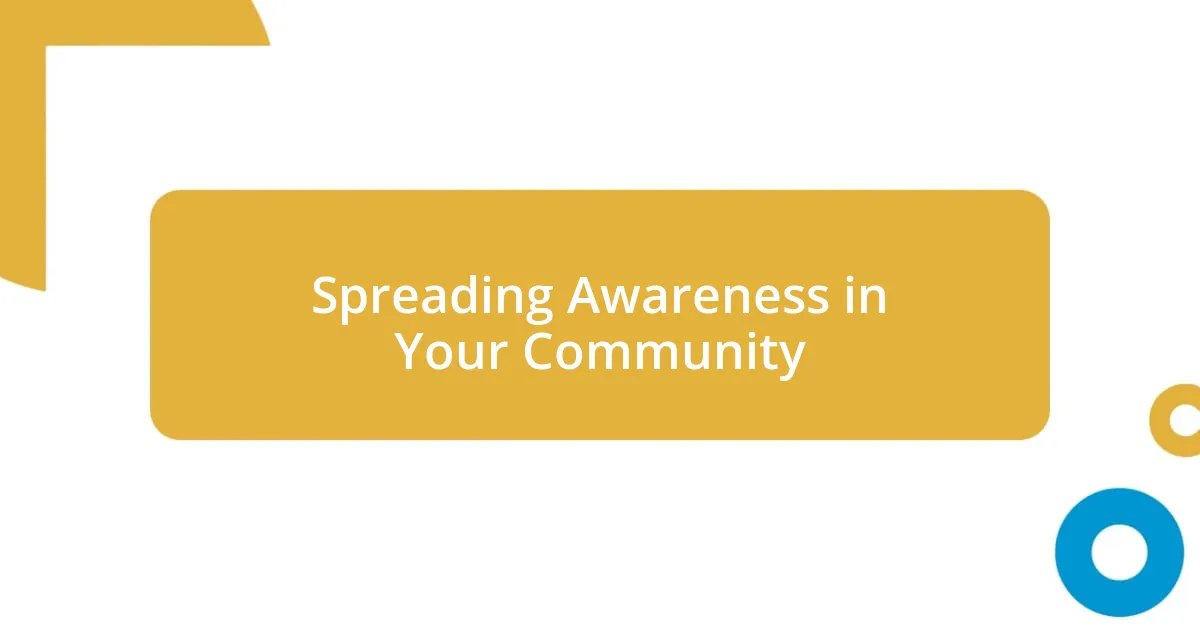
Spreading Awareness in Your Community
Spreading awareness within your community requires a multi-faceted approach. I once organized a small event in my neighborhood where we invited local speakers to share their mental health journeys. The turnout was surprisingly high, and the energy in the room was palpable. It was a reminder that people truly crave authentic conversations; have you ever considered how impactful simply sharing stories can be?
Engaging with local schools is another fantastic avenue for spreading awareness. I volunteered to lead workshops at my kids’ school, focusing on mental health education. Watching the students actively participate and ask questions was incredibly rewarding. It’s astonishing how young minds can grasp these concepts when they’re presented in relatable ways. Have you noticed how much young people yearn for guidance in this area?
Lastly, I believe social media can be an effective tool for building community awareness. I started a small group online where community members could share resources and support each other. It’s become a safe space, and the feedback has been overwhelmingly positive. Doesn’t it feel empowering to create a digital refuge where everyone can connect? By fostering these conversations, we not only raise awareness but also cultivate a stronger sense of belonging.












